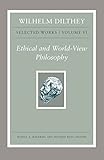Wilhelm Dilthey: Selected Works, Volume VI : Ethical and World-View Philosophy / Wilhelm Dilthey; ed. by Frithjof Rodi, Rudolf A. Makkreel.
Material type: TextPublisher: Princeton, NJ : Princeton University Press, [2019]Copyright date: ©2019Description: 1 online resource (360 p.)Content type:
TextPublisher: Princeton, NJ : Princeton University Press, [2019]Copyright date: ©2019Description: 1 online resource (360 p.)Content type: - 9780691195575
- 9780691197371
- online - DeGruyter
- Issued also in print.
| Item type | Current library | Call number | URL | Status | Notes | Barcode | |
|---|---|---|---|---|---|---|---|
 eBook
eBook
|
Biblioteca "Angelicum" Pont. Univ. S.Tommaso d'Aquino Nuvola online | online - DeGruyter (Browse shelf(Opens below)) | Online access | Not for loan (Accesso limitato) | Accesso per gli utenti autorizzati / Access for authorized users | (dgr)9780691197371 |
Frontmatter -- CONTENTS -- PREFACE TO ALL VOLUMES -- EDITORIAL NOTE TO VOLUME VI -- INTRODUCTION TO VOLUME VI -- PART I. SYSTEM OF ETHICS (1890) -- PART II. PRESENT-DAY CULTURE AND PHILOSOPHY (1898-1900) -- PART III. DREAM (1903) -- PART IV. THE ESSENCE OF PHILOSOPHY (1907) -- PART V. THE TYPES OF WORLD-VIEW AND THEIR DEVELOPMENT IN METAPHYSICAL SYSTEMS (1911) -- PART VI. THE PROBLEM OF RELIGION (1911) -- GLOSSARY -- INDEX
restricted access online access with authorization star
http://purl.org/coar/access_right/c_16ec
This book completes a landmark six-volume translation of the major writings of Wilhelm Dilthey (1833-1911), a philosopher and historian of culture who continues to have a significant influence on philosophy, hermeneutics, and the theory of the human sciences. These volumes make available to English readers texts that represent the full range of Dilthey's work.The works in this volume present Dilthey's most deeply held views about philosophy and how it can guide human practices. System of Ethics (1890) argues that Humean sympathy motivates us only externally and must be replaced with the internally motivated fellow-feeling of solidarity that respects others as ends in themselves. The Essence of Philosophy (1907) demonstrates how philosophy has developed from its traditional metaphysical role to the epistemological and encyclopedic functions that ground and order the natural and human sciences. The work also discloses an orientational function of philosophy that is explored further in "The Types of World-View and Their Development" (1911). Philosophical world-views are important in that they address the existential needs and riddles that grow out of life experience and are not solved by any of the sciences.In addition, the book features three other significant essays. "Present Day Culture and Philosophy" (1898) concerns the challenges to philosophy posed by contemporary culture. "Dream" (1903) is about the thinkers portrayed in Raphael's School of Athens and Dilthey's worries about them breaking up into three divergent groups. Finally, "The Problem of Religion" (1911) considers how religiosity can still inform lived experience in secular times.
Issued also in print.
Mode of access: Internet via World Wide Web.
In English.
Description based on online resource; title from PDF title page (publisher's Web site, viewed 21. Jun 2021)


